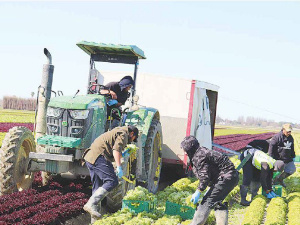Local vegetable growers are in full “clean up, tidy up” mode, says Pukekohe Vegetable Growers’ Association (PVGA) president, Kirit Makan.
“Everyone’s in full swing getting the onion harvest completed and hoping for more good weather.”
A lot of remedial work was being carried out, moving silt back on to paddocks and emptying out silt traps as well as repairing damage then cultivating soil, sometimes for the second time.
The Auckland flooding saw over 200mm of rain fall in late January, then other areas received the same dousing two weeks later with Cyclone Gabrielle.
There were pockets of larger vegetables losses with Makan estimating “quite a few tonnes” of onions were lost. Potato losses were feared a result of water sitting in low lying paddocks for some time which could cause them to rot.
Spinach crops had also been affected by the heavy rain and while there were other crop losses those were difficult to quantify, without approaching each and every grower.
“They’re pretty stressed at the moment, so we haven’t done that,” he told Hort News.
The PVGA had reassured them it was there to help and Horticulture New Zealand was encouraging growers to apply for immediate Government financial assistance to help clean up silt, which some had already received.
Makan says growers were unlikely to make changes to the crops they planted because of the delay the rains caused in getting them into the soil.
“There’s not a lot to be gained. It’s still warm and so long as the weather stays fine the ground’s good for working up.”
grower, Bharat Jivan, says he’s noticing potato yields are well below potential. Due to low light levels through the summer, he estimates the size profile is down and harvests from some of their blocks may be from 15 to 30 percent down on average.
He and his brother harvest potatoes all year round but many Pukekohe growers plant their crops in November and December so they can be ground-stored and harvested through the winter.
Because of earlier wet weather, planting was delayed until closer to the end of the year, meaning they were just finishing off growing now.
“They haven’t had a good growing season so we’re not going to hit average yields,” Jivan says. “We haven’t really had a summer. If that’s how we feel imagine how it is for plants.”
He had around 50 hectares of onions waiting to be harvested when the first rain event hit and was now noticing skin quality wasn’t as good as it should be.
The crop will spend a couple of weeks in storage sheds during which he’s worried that some onions could rot, deteriorate or collapse.
“That will mean we’ll have to send them to appropriate markets,” he told Hort News.
Some growers will be faced with double their usual costs of using machinery or hiring contractors to clean out their silt traps then put soil back on their paddocks where it had been washed off during the rain.
“The soil has moved to drains, silt traps and headlands and some growers have lost topsoil with scouring through the middle of their paddocks,” Jivan says.
“There’s lots of work to be done and we just need fine weather to get the soil worked up. Fingers crossed.”
Ironically, some growers had made big investments last year putting in irrigation systems, which they had not needed to use at all so far this summer.
“But who knows what the next season will be like.”











